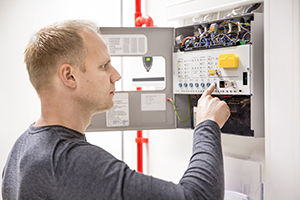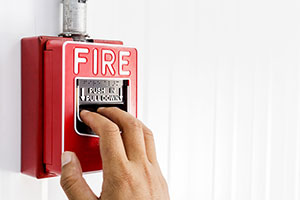Siemens Elf & Safety Advice: where there’s smoke, there isn’t always fire!

As the countdown to Christmas gets well and truly underway with offices and places of work getting into the festive spirit, Siemens Building Technologies is warning UK businesses about the potential consequences of false fire alarms during the busiest period of the year. False alarms from remotely-monitored fire detection and alarm systems cost the UK economy an estimated £1 billion in business disruption* with 95% of automatically-generated alarms being proved to be false** placing Fire and Rescue Services (F&RS) and the public at unnecessary risk. “The vast majority of automatic alarm calls are proven to be false and are often caused by either false fire triggers or the inadequate maintenance of alarm systems,” commented Don Scott, fire engineering consultant Siemens Building Technologies. “Christmas is already a time of heightened risk of fire for many businesses with the F&RS stretched to capacity across the country. False alarms create further pressures when emergency services have to challenge whether alarms are genuine before attending incidents – the time lost could end up costing thousands of pounds in repairs or at worst, put lives at risk.” Ionisation or single-sensor optical smoke detectors are a common cause of false alarm activations as they have difficulty in accurately distinguishing between airborne pollutants, such as steam, aerosols, dust, cooking fumes, insects, sparks, embers and a real fire. The incorrect siting of detectors can also be triggered if there is excessive air movement from mechanical heating or ventilation. Multi-sensor detectors are responsive to more than one fire phenomena, i.e. smoke, heat and carbon-monoxide and are proven to be more immune to false alarm phenomena thereby giving fewer false activations. For more stringent applications; beam detectors, heat detectors and aspirating detectors are available. A regular maintenance programme ensures the correct functioning of a fire alarm system – inadequate servicing and testing compromise safety. If an alarm system is aging or becoming unreliable replacement is advised when offset against the cost of disruption to a business. Generally, detectors should be replaced every 10-15 years, depending upon the environment in which they are installed and the manufacturers recommendations. Dave Green, national officer, Fire Brigades Union added: “False alarms use up resources which could be better served elsewhere, and increase response times to actual emergencies. But it is better to be safe than sorry, and fire services should always be called when any alarm is raised.” “Fire services are under more pressure than ever before, dealing with more incidents and more fires, with increasingly fewer firefighters. Since 2009, there has been a 23% decrease in the number of firefighters across the UK. This huge decrease in the number of firefighters has meant that preventative work, which would help to reduce the number of false alarms, has worryingly fallen by the wayside.” * https://www.bre.co.uk/page.jsp?id=3527 **https://www.abi.org.uk/globalassets/files/publications/public/property/2018/07/abi-fpa-detection-demonstration-report-2018.pdf
Advanced Maintainer course from the qualification pathway re-released

The Fire Industry Association has re-launched the fire detection and alarms Advance Maintainer unit of the qualification pathway, which is available to book now. This unit forms one of the specialist units of the new qualifications that are designed for those working in the fire detection and alarm sector. The FIA provides nationally recognised qualifications for fire detection and alarm. Those studying the Maintainer unit as part of the qualification pathway will be awarded the FIA AO Level 3 in Fire Detection and Alarm Maintenance, Theory, and Regulatory Requirements. In order to gain the full qualification, learners must take and pass four units: Foundation course Health and Safety Environmental Advanced Maintainer Before taking the Advanced Maintainer unit, learners need to have taken and passed the Foundation course first so that they can build on their knowledge and go on to specialise in maintenance. The Foundation course is the entry point for the qualification, and the other units can be studied in any order. “As a not for profit organisation, our main aim for these new qualifications was to provide a high level of education for those in the industry, and to raise the bar and the standard of professionalism. Overall, by giving our technicians and engineers the opportunity to study and walk away with a qualification, we are giving employers more knowledgeable staff, and end users more confidence in the skills they are purchasing,” commented Ian Moore, CEO of the FIA. “We’ve invested heavily into these courses with a range of new technology for the assessment and booking processes, and into the development of the courses themselves to suit the needs of learners and employers, and we are constantly reinvesting so that we stay at the forefront of development.” Those studying the Advanced Maintainer unit as part of the qualification will learn about legislative requirements, codes of practice such as BS 5839, necessary documentation, maintenance methods, false alarm management, and waste management. “By studying with us, learners will gain an extensive knowledge and understanding of what they need to know as a fire detection and alarm systems maintainer. This unit builds on what learners will have been introduced to in the first unit of the qualification pathway, the Foundation unit. The Advanced Maintenance unit develops that knowledge and takes it further and deeper into the subject of maintaining a fire alarm system – discussing things like what you do to fix specific problems, how to test, and to understand a variety of common problems that may occur,” said Ian Moore. The Advanced Maintenance unit is available to book now to those that have already taken and passed the Foundation unit of the qualification pathway. Book now: https://www.fia.uk.com/training/training-course-browser.html




